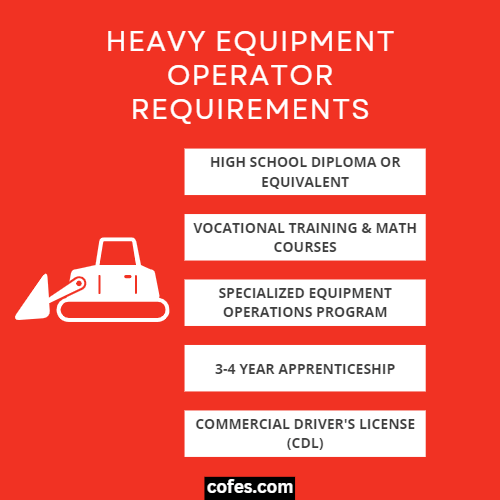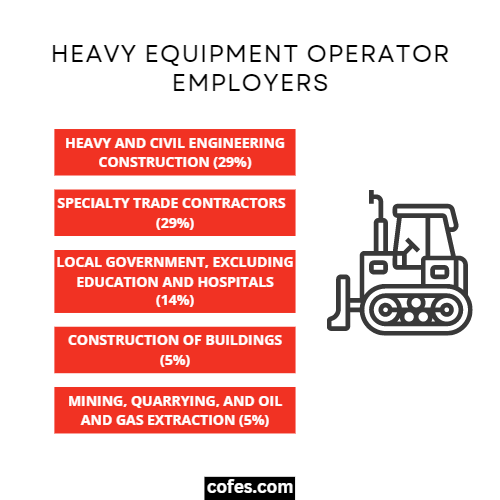Every construction project necessitates the use of heavy equipment operators.
They operate a fleet of huge trucks that perform specific tasks on construction sites.
Operators of heavy machinery have a profusion of toys at their disposal.
Bridges, buildings, and roads all require the use of these tools, and their operators are always on standby to operate the equipment and load, remove, and reposition materials such as boulders and garbage.
Heavy equipment operators get their equipment ready for work, keep it in good working order, and follow safety precautions at all times.
They are the finest judges of what their child can do and when it can perform at its best.
As a result, heavy equipment operators should observe the workflow and offer suggestions for improvement as needed.
Heavy Equipment Operator Information
| Official Job Title | Heavy Equipment Operator |
| Average Salary | $52,875 |
| Stress Level | Average |
| Work/Life | High |
| Job Satisfaction | Average |
| Career Advancement | Average |
Heavy Equipment Operator Job Description
What Is A Heavy Equipment Operator?
A heavy equipment operator is someone who drives and controls large pieces of construction and engineering equipment.
Heavy equipment is often only operated by professional individuals who have completed specialized training.
What Does A Heavy Equipment Operator Do Daily?
Bulldozers, forklifts, backhoes, dump trucks, cargo trucks, and hydraulic truck cranes are heavy equipment operators’ construction equipment.
To help create constructions such as roads, bridges, and buildings, they use this equipment to assist them in their work.
Heavy machinery operators often specialize in one of three areas.
Construction equipment operators, often known as operational engineers, are in charge of loading and digging machines.
To excavate and raise soil or sand, they employ this equipment.
Construction of roads necessitates concrete and asphalt spreading equipment operated by paving and surface equipment operators.
Pile-driver operators operate heavy machinery to pound piles of wood, concrete, and steel into the earth.
Responsibilities, Duties & Roles Of A Heavy Equipment Operator
The specific responsibilities of heavy machinery operators can vary based on their training and experience.
Typical duties include the following:
- Use heavy machinery following the safety policies and procedures of the company.
- Recommend ways to keep environmental performance at or above current levels.
- Take equipment out of trucks or trailers.
- Keep the worksite and corporate equipment well-maintained, tidy, and properly stored. Scrap, surplus resources, and garbage collection and disposal
- Determine where low spots exist in the distribution of paving and advise workers to supply more material.
- Submit all required papers, reports, and other documents.
Heavy Equipment Operator Salary
Average Salary
A Heavy Equipment Operator can expect to make $52,875 a year on average.
Your payment will vary based on where you work, your experience level, and your skills.
Starting Salary
A Heavy Equipment Operator can expect to make anywhere between $27,957 a year on Starting.
Your payment will vary based on where you work, your experience level, and your skills.
Senior Salary
Senior heavy equipment operators could make up to $103,972.
Your payment will vary based on where you work, your experience level, and your skills.
How To Become A Heavy Equipment Operator

The Entry Level: Certification, Training & Degree
To start in this field, learn how to operate light equipment under the supervision of an experienced operator.
Education is not required.
Apprenticeships: It contains a combination of classroom and on-the-job training for a period of three to four years.
During on-the-job training, you’ll learn how to operate and maintain equipment.
Teachers will instruct you on operational procedures, safety measures, and first aid in the classroom.
Licensure: If you operate heavy equipment or carry it to work locations, the municipality where you work may require you to acquire a license.
Some states require a CDL to transport heavy equipment.
Some towns and states need crane licenses for pile-driver operators.
Other Skill Sets, Requirements & Qualifications
A license and formal training aren’t the only things you’ll need if you want to work in this field.
- Hand and foot coordination: You need to synchronize your hand and foot movements to maneuver giant machines across confined spaces.
- Operation Monitoring: You’ll have to watch gauges, dials, and other operational indicators and make adjustments as needed.
- Interpersonal skills and teamwork: You’ll need interpersonal skills and the ability to operate as a team on a hectic construction site.
- Troubleshooting: Operating difficulties should be detected and fixed by anyone operating heavy equipment.
- Problem-solving skills: Your employer will demand you evaluate the advantages and disadvantages of many solutions to select the best chance of success and affordability.
How Long Does it Take to Become a Heavy Equipment Operator?
Though there are no shortcuts to learning to operate equipment effectively and safely, you can typically spend anywhere from 4 months to 4 years.
Is it Hard To Become A Heavy Equipment Operator?
The type of equipment you want to learn and how far you want your career will greatly decide.
Apprenticeships are a superb opportunity to study and earn money at the same time.
Heavy Equipment Operator Career Paths
The Heavy Equipment Operator Roadmap
Knowledge
The knowledge you acquire from working in the construction sector is invaluable.
Work as a worker to have some experience under your belt before moving on to more advanced programs.
IUOE is the largest union for operating engineers, according to the BLS, and it provides apprenticeship programs.
Before graduating, an IUOE apprentice works on a construction site or at a union facility for about three years.
Excavation, demolition, and bulldozing are common themes.
At least 18-year-old apprentices who have completed or plan to complete high school should apply.
Candidates might investigate combined apprenticeship programs offered by community institutions and local labor groups.
Some of the concepts covered in these courses include OSHA laws and safety and different equipment kinds, first aid, algebra, and job site fundamentals.
Make Yourself Employable by Getting Your Career in Order
Applicants must work in various weather conditions and shifts, and they must follow specific directions.
Employers may order construction workers to travel to several job locations.
Thus they prefer to hire someone with a commercial driver’s license.
Employers may also choose candidates who have undergone OSHA-approved safety training courses or have worked on OSHA-compliant job sites.
Continue Investing in Yourself Academically to Advance Your Career
Those who complete their apprenticeship and are employed as construction machine operators may benefit from further training.
Continuing education training helps operators stay up-to-date on the latest industry safety procedures by familiarizing them with the newest equipment.
Projections For Growth In Heavy Equipment Operator jobs
Across all industries, the average projected growth rate through 2031 is 5%. Click here for more details.
Is Heavy Equipment Operator A Good Career?
This position is not only in high demand right now, but it also has the potential to pay very high.
Many of the operators say it’s their favorite job ever.
Working Conditions
Can A Heavy Equipment Operator Work Remotely From Home?
No.
Operating heavy equipment on construction sites will be part of your responsibilities as a Heavy Equipment Operator.
Additionally, you’ll collaborate closely with the ground crew.
How Many Hours Does A Heavy Equipment Operator Work?
These workers’ timetables may encompass overnights and late nights.
You need to be flexible enough to work evenings and weekends if necessary.
Can A Heavy Equipment Operator Work Part-Time?
These are full-time occupations.
Construction projects might happen at any time.
What Are The Average Vacation Days Of Heavy Equipment Operators?
Vacations for Heavy equipment operators are usually 10-14 days long during the busiest seasons of the year.

Alternative Careers & Similar Jobs to a Heavy Equipment Operator
- Construction Worker
- Construction Manager
- Surveyor
- Cost Estimator
- Ironworker
- Safety Engineer
- Supervisor
- Electrical Engineer
- Drafter
- Maintenance Engineer
- Engineering Technician
Heavy Equipment Operator Resume Tips
- Personalize each CV you send to meet the job’s needs.
- At the top of the CV, include the heavy equipment operator’s objective or summary.
- Don’t just describe your responsibilities in your work experience section—showcase your accomplishments!
- Add a section to your resume for certificates, awards, supplementary training, or blogging.
Heavy Equipment Operator Interview Questions
- Can you tell me about your experience operating heavy machinery?
- How would you react if a project took longer than expected?
- What safety measures will you take when operating heavy machinery?
- In a noisy construction site, how would you communicate with a coworker?
- How would you conserve energy if you worked long hours?
Why They Work
- The number of years the candidate has worked in the field and the standard equipment is revealed.
- Interpersonal, time management, and problem-solving abilities are highlighted.
- Knowledge of operating and safety rules is demonstrated.
- This game puts your communication and inventiveness to the test.
- Looks at both physical and emotional well-being.
Tips For Hiring A Heavy Equipment Operator
Key Characteristics To Look For In A Heavy Equipment Operator
- Calculation skills for basic cuts and fills
- Ability to read blueprints and plans, as well as grade stakes
- Understanding of the fundamental concepts of soil compaction as well as the skills required to achieve it
- Recognizing the need for adequate Jobsite drainage
- Arriving on time to work and maintaining a positive working relationship with those with whom they interact
- They are aware of their limitations and skill level.
